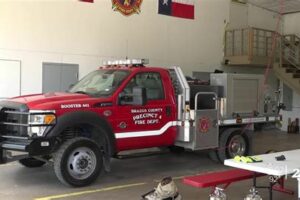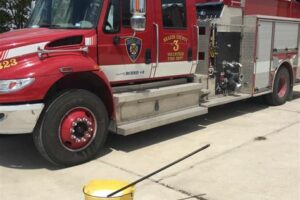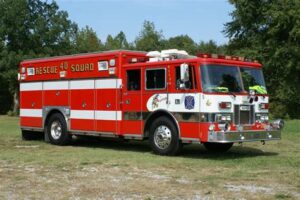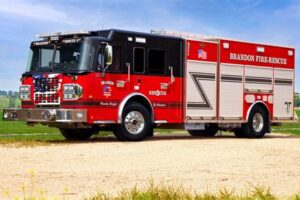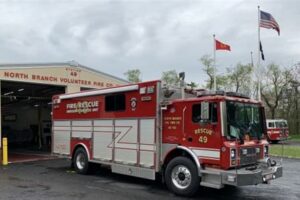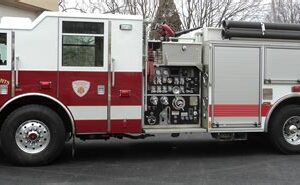Table of Contents
Discover the vital role of volunteer fire departments in Texas. Learn about their dedication, bravery, and commitment to protecting communities across the Lone Star State. Explore the challenges they face and the invaluable services they provide, from emergency response to fire prevention. Support these selfless heroes as they safeguard lives and property, making Texas a safer place for all.
Volunteer Fire Departments in Texas are the unsung heroes of their communities, tirelessly battling flames and risking their lives to protect their neighbors. Without any compensation, these brave men and women selflessly dedicate their time and expertise to ensure the safety of others. In a state known for its vast stretches of land and unpredictable weather patterns, these volunteer firefighters are the first line of defense against wildfires, industrial accidents, and other emergencies. From small towns to bustling cities, they form an essential backbone of Texas’ emergency response system, highlighting the true spirit of unity and service.
Introduction
Volunteer fire departments play a crucial role in ensuring the safety and well-being of communities across the vast state of Texas. These dedicated men and women selflessly give their time and effort to protect lives and property, often in remote areas where professional fire services may not be readily available. With their unwavering commitment to public service, volunteer fire departments have become an integral part of Texas’ emergency response system.
History of Volunteering
The tradition of volunteer firefighting in Texas dates back to the early days of settlement. As pioneers established towns and cities, they recognized the need for fire protection. Without access to professional firefighters, local residents banded together to form volunteer fire brigades. These early volunteers relied on simple hand pumps, horse-drawn carriages, and buckets to combat fires. Over time, these grassroots efforts evolved into organized volunteer fire departments that continue to serve Texas communities today.
Training and Certification
Volunteer firefighters in Texas undergo rigorous training to ensure they are prepared to handle emergencies effectively. The Texas Commission on Fire Protection oversees certification programs that cover various aspects of firefighting, including fire suppression, hazardous materials response, and emergency medical services. Volunteers must complete these training programs to obtain the necessary certifications, which are crucial for their safety and the safety of the community they serve.
Equipment and Resources
While volunteer fire departments may face budget constraints, they strive to provide adequate equipment and resources to their members. These departments rely on donations, fundraisers, and grants to acquire firefighting apparatus, protective gear, and communication systems. Additionally, they often collaborate with neighboring departments and government agencies to share resources during major incidents or when specialized equipment is required.
Challenges Faced
Volunteer fire departments in Texas encounter numerous challenges in their mission to protect communities. One significant challenge is the vast geographical expanse of the state, which can make response times lengthy, particularly in rural areas. Furthermore, recruiting and retaining volunteers can be difficult due to the demanding nature of the role and the time commitment required. Limited funding also poses a challenge, as volunteer departments heavily rely on community support and fundraising efforts.
Community Engagement and Support
Communities across Texas play a crucial role in supporting their local volunteer fire departments. Residents often participate in fundraisers, donate funds, and volunteer their time to assist with department activities. This strong sense of community involvement fosters a close relationship between the department and the people it serves, ensuring continued support for the vital work carried out by these volunteers.
Response Capabilities
Despite the challenges they face, volunteer fire departments in Texas possess impressive response capabilities. These departments respond to a wide range of emergencies, including structure fires, wildland fires, motor vehicle accidents, and medical emergencies. Volunteers are trained to initiate initial fire suppression, perform search and rescue operations, provide emergency medical care, and coordinate with professional services when needed.
Mutual Aid Agreements
To enhance their response capabilities, volunteer fire departments often enter into mutual aid agreements with neighboring departments. These agreements allow departments to request assistance from one another during large-scale incidents or when additional resources are required. This collaborative approach ensures an efficient and coordinated response, benefiting both rural and urban communities across Texas.
Recognition and Appreciation
Volunteer firefighters in Texas deserve recognition and appreciation for their selfless dedication to public service. Their commitment to protecting lives and property often goes unnoticed, but their bravery and sacrifice should not be taken for granted. It is essential for communities to acknowledge and express gratitude for the invaluable contribution these volunteers make in keeping Texas safe.
Conclusion
Volunteer fire departments in Texas are an integral part of the state’s emergency response system. These dedicated volunteers face numerous challenges but continue to serve their communities with unwavering commitment and courage. Through their training, collaboration, and community engagement, volunteer firefighters play a crucial role in keeping Texas safe. It is imperative that their efforts are recognized and supported, ensuring the continued success of these vital organizations.
The Rich History of Volunteer Fire Departments in Texas
From humble beginnings in small rural communities to bustling urban centers, volunteer fire departments have played a crucial role in protecting lives and property across the Lone Star State for over a century. These selfless men and women have dedicated countless hours to train, respond to emergencies, and ensure the safety of their fellow Texans.
The Challenges Faced by Volunteer Fire Departments
Despite their unwavering commitment to public safety, volunteer fire departments in Texas often face numerous challenges. From limited funding and resources to the ever-increasing demands of a growing population, these departments constantly strive to adapt and modernize in order to effectively serve their communities.
The Crucial Role of Volunteer Firefighters
Volunteer firefighters in Texas are true heroes, sacrificing their time and energy to protect their neighbors and communities. From battling raging wildfires in the vast open expanses of West Texas to responding to house fires in tight-knit rural towns, these brave men and women exemplify the spirit of selflessness and service that defines the Lone Star State.
Training and Certification
Volunteer fire departments in Texas place a strong emphasis on training and certification to ensure their firefighters are equipped with the necessary skills and knowledge to respond to emergencies. Through rigorous programs and exercises, these departments strive to maintain high standards of professionalism and safety.
Community Involvement and Support
Volunteer fire departments in Texas rely heavily on the support and involvement of their local communities. From fundraising events and donations to recruitment drives and community outreach initiatives, these departments actively engage with their residents to foster a sense of unity and shared responsibility for public safety.
Mutual Aid Agreements
Due to the vast geographical expanse of Texas, many volunteer fire departments have established mutual aid agreements with neighboring jurisdictions. These agreements allow departments to assist one another during large-scale emergencies or when additional resources are required, showcasing the camaraderie and cooperation that exist within the firefighting community.
Addressing Rural Fire Protection Challenges
Rural volunteer fire departments face unique challenges due to their often limited funding and vast response areas. Despite these challenges, these departments employ innovative strategies such as volunteer recruitment drives, grant applications, and collaborative partnerships with neighboring fire departments and organizations to ensure efficient service delivery.
The Future of Volunteer Fire Departments
As Texas continues to experience substantial population growth and urban development, the future of volunteer fire departments remains uncertain. Efforts are being made to ensure sustainable funding, recruit new volunteers, and modernize equipment to meet the evolving needs of Texas communities, as these indispensable departments strive to safeguard the lives and property of those they serve.
Volunteer fire departments in Texas play a vital role in the state’s firefighting efforts, serving as the backbone of many rural communities. With their commitment to public safety and selflessness, these dedicated individuals serve as true heroes, protecting lives and property across the Lone Star State.
1. Essential Service:
Volunteer fire departments provide an essential service, especially in areas where professional fire departments may be limited due to budget constraints or geographical challenges. These volunteers willingly step up to fill this gap, ensuring that residents have access to life-saving emergency response when needed.
2. Local Community Support:
These volunteer firefighters are often local residents who intimately understand the unique needs and challenges of their community. This deep connection allows them to provide tailored support during emergencies, such as understanding the best routes to reach remote areas or having knowledge of local water sources for firefighting efforts.
3. Cost-Effective Solution:
Volunteer fire departments offer a cost-effective solution to fire protection, as they save communities substantial amounts of money compared to maintaining a fully staffed professional fire department. These volunteers not only donate their time but also often contribute their own resources, including personal equipment and vehicles.
4. Training and Expertise:
While volunteer firefighters may not be full-time professionals, they undergo extensive training to ensure they can handle a range of emergency situations competently. They receive training in fire suppression techniques, medical aid, hazardous materials response, and other critical skills. This dedication to ongoing education ensures they remain capable and prepared to respond to any emergency.
5. Community Engagement:
Volunteer fire departments foster a strong sense of community engagement and unity. Beyond their emergency response role, they often organize community events, fundraisers, and education programs to promote fire safety and preparedness. This proactive approach builds trust and strengthens the bond between the department and the community it serves.
6. Mutual Aid Cooperation:
Volunteer fire departments in Texas understand the importance of cooperation and mutual aid. When faced with large-scale emergencies or incidents that require additional resources, these departments work together seamlessly to provide the necessary support. This collaborative spirit ensures a more effective and efficient response to critical situations.
7. Sacrifice and Dedication:
Above all, volunteer firefighters in Texas exemplify sacrifice and dedication. They selflessly put their lives on the line to protect others, often juggling their commitment to the department alongside their regular jobs and personal responsibilities. Their unwavering dedication to public safety deserves recognition and appreciation.
As volunteer fire departments continue to serve Texas communities, it is crucial to support and appreciate their invaluable contributions. These selfless individuals embody the true spirit of community service, and their heroic efforts deserve our utmost respect.
Thank you for taking the time to explore the fascinating world of volunteer fire departments in Texas. Throughout this article, we have delved into the critical role these brave men and women play in ensuring the safety and well-being of their communities. From their tireless dedication to their exceptional training, it is clear that volunteer firefighters are the backbone of emergency response in the Lone Star State.
First and foremost, it is important to acknowledge the immense sacrifices made by these selfless individuals. Whether it be leaving their families at a moment’s notice or risking their own lives to save others, volunteer firefighters embody the true essence of heroism. Their unwavering commitment to public service is truly awe-inspiring.
Furthermore, the level of training and expertise exhibited by volunteer firefighters is nothing short of remarkable. Despite being volunteers, these individuals undergo rigorous training programs to ensure they are prepared to handle any emergency situation that may arise. From learning how to operate complex firefighting equipment to mastering life-saving techniques, their dedication to honing their skills is evident.
Lastly, it is crucial to highlight the impact that volunteer fire departments have on their respective communities. Beyond responding to emergencies, these departments often engage in community outreach initiatives, such as educational programs and fire prevention campaigns. By actively involving themselves in the fabric of their neighborhoods, volunteer firefighters foster a sense of unity and safety among residents.
In conclusion, volunteer fire departments in Texas are an integral part of the state’s emergency response system. Their bravery, training, and community involvement make them invaluable assets to the communities they serve. So, next time you see a firefighter in your local town, take a moment to express your gratitude for their unwavering dedication and selflessness. They truly are the unsung heroes of Texas.
Video Volunteer Fire Departments In Texas
Journalist Voice and Tone:
1.
What is a Volunteer Fire Department?
A Volunteer Fire Department (VFD) is a group of individuals who dedicate their time and effort to providing fire protection and emergency services to their communities without receiving monetary compensation. These departments are typically made up of local residents who have undergone training to become firefighters or first responders.
2.
How do Volunteer Fire Departments operate in Texas?
In Texas, Volunteer Fire Departments operate under the guidance and regulations set forth by the Texas Commission on Fire Protection (TCFP) and the State Firefighters’ and Fire Marshals’ Association of Texas (SFFMA). They rely on a combination of local funding, grants, and donations to maintain their operations, including purchasing equipment, training firefighters, and maintaining fire stations.
3.
Are Volunteer Fire Departments effective in Texas?
Yes, Volunteer Fire Departments play a vital role in providing fire protection and emergency services across rural communities in Texas. They often serve areas where professional fire departments may not be readily available due to budget constraints or geographic limitations. Volunteer firefighters undergo rigorous training to ensure they can effectively respond to various emergencies, making them an integral part of the state’s emergency response system.
4.
How can I become a volunteer firefighter in Texas?
To become a volunteer firefighter in Texas, individuals must meet certain requirements set by the TCFP and SFFMA. This typically includes completing a certified firefighting course, obtaining CPR and first aid certifications, and passing physical fitness tests. Interested individuals should reach out to their local Volunteer Fire Department for information on training programs and application procedures.
5.
Do Volunteer Fire Departments provide services other than firefighting?
Yes, Volunteer Fire Departments in Texas often offer a range of emergency services beyond firefighting. They may provide assistance during medical emergencies, motor vehicle accidents, hazardous material incidents, and other types of emergencies. Some departments also conduct community outreach programs to educate residents about fire safety and prevention.
6.
How can I support Volunteer Fire Departments in Texas?
There are several ways to support Volunteer Fire Departments in Texas. You can consider making monetary donations to your local department or volunteering your time to assist with administrative tasks or fundraising events. Additionally, spreading awareness about the importance of volunteer firefighters within your community can help garner support and recognition for their efforts.

